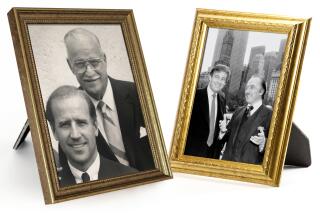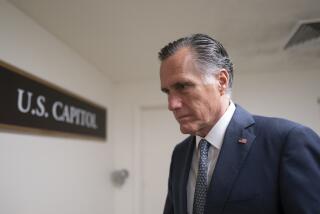Mitt Romney low-key on civil rights, in contrast to his father
- Share via
ANN ARBOR, Mich. — In 1963, an explosive year in the quest for civil rights, George Romney appeared unannounced in the mostly white suburb of Grosse Pointe and marched to the front of an anti-segregation demonstration to stand beside black leaders.
Letters from startled constituents poured into the office of the first-term Michigan governor, whose son Mitt was then 16. Supporters who had helped the elder Romney win his narrow victory the previous November said his actions made him “a double-crosser” and a “Judas” to the people who voted for him. Their diatribes were sprinkled with warnings that they would work against him: “You are a ‘dead duck’ for 1964,” one detractor typed above a newspaper photograph of a shirt-sleeved Romney walking shoulder to shoulder with civil rights activists.
Romney pressed ahead with an aggressive civil rights agenda that ultimately put him at odds with the leaders of his party. He refused to back Barry Goldwater as the 1964 Republican presidential nominee because, he told Goldwater in a letter, he was alarmed by indications that Goldwater’s strategists “proposed to make an all-out push for the Southern white segregationist vote” and “exploit the so-called ‘white backlash’ in the North.”
George Romney began pushing reforms to end discrimination toward minorities in housing soon after taking office in 1963 — work that would lead to his highly controversial effort to integrate the nation’s white suburbs as President Nixon’s secretary of Housing and Urban Development. He launched his own 1968 presidential run after a 19-day tour of the ghettos of 17 cities, turning a spotlight on the decay and overcrowding that had contributed to riots in Detroit and elsewhere.
His son, running against the nation’s first black president 44 years later, leaves a very different impression. Mitt Romney rarely mentions his father’s efforts on civil rights and declined an interview request to discuss how that work influenced his own agenda on those issues, which have not figured prominently in his own career or presidential campaigns. (The only memorable time it has come up publicly was in 2007, when he mistakenly said he had seen his father march with the Rev.Martin Luther King Jr.He later said he meant the word “saw” in a “figurative sense.”)
Although he will address the NAACP’s annual convention on Wednesday, Romney has campaigned over the last year in front of predominantly white audiences. A rare exception to that pattern was his May visit to a charter school in a mostly black area of west Philadelphia, where he promoted his plans to push for more school choice. There he called the education achievement gap between minority and nonminority students “the civil rights issue of our time” for “people of color in this society.”
When Romney took over as governor of Massachusetts in 2003, the state still bore the tensions of wrenching battles over school busing and other race-inflected disputes. He assembled a group of black leaders that served as an informal “kitchen Cabinet” and met with him quarterly throughout his administration.
But he got off to a rocky start with other civil rights activists when he issued an executive order that eliminated the Office of Affirmative Action and replaced it with a new Office of Diversity and Equal Opportunity. Opponents argued that by eliminating previous executive orders, he had taken the teeth out of the state’s enforcement of affirmative action.
Romney said he was merely trying to streamline outdated executive orders. At a heated town-hall-style meeting at a black church, he said he was not looking to change any provisions that ensured “diversity in our commonwealth,” the Boston Globe reported.
Romney said he would suspend his changes and wait for recommendations from an appointed panel, but he never took action on its suggestions. Critics were not impressed.
“He has no record on civil rights,” Leonard C. Alkins, a panel member and then-president of the Boston chapter of the National Assn. for the Advancement of Colored People, said in an interview.
The Rev. Jeffrey L. Brown, one of the black pastors who met quarterly with Romney, had a different take. “It showed me that he was a guy who listened; that he wasn’t rigid,” said Brown, whom Romney later asked to oversee care for Hurricane Katrina evacuees.
Romney and his defenders noted that 37% of state hires during his term were minorities. Though he was criticized for a lack of diversity in his judicial appointments, half of his top advisors were women, ranking Massachusetts ahead of the other 49 states, according to a 2004 study by the Center for Women in Government & Civil Society at the University at Albany.
Part of the shift in emphasis between father and son stems from demographics; in the decades since George Romney ran for office, the nation’s racial discussions have expanded from black and white to encompass Latinos and others.
Mitt Romney is also a far more conflict-averse candidate than his father. George Romney’s focus on civil rights invited persistent questions about the Mormon Church of the sort that his son has sought to avoid, including about its pre-1978 policy of excluding blacks from the priesthood.
When Mitt Romney was asked about that four years ago on NBC’s “Meet the Press,” he immediately invoked his parents’ work on civil rights. Losing his composure for a moment during the interview with Tim Russert, then the show’s host, Romney said that when news came over the radio that the church had abolished its ban on black leadership, he pulled over his car and wept. In the interview he echoed — almost to the word — phrases that his father used throughout the 1960s, including that his “most core belief is that all people are children of God.”
“I had no question in my mind that African Americans, and blacks generally, would have every right and every benefit in the hereafter that anyone else had,” Mitt Romney told Russert.
George Romney’s work on civil rights began in earnest while he was still an auto executive heading American Motors Corp., according to letters, memos and interviews within the collection of his papers at the Bentley Historical Library at the University of Michigan. As a delegate at the state’s constitutional convention in 1962, he banded with others to press for including in the state constitution a controversial Civil Rights Commission, which would be charged with enforcing the state’s civil rights laws.
“I speak as a member of a minority group that knows the longtime harmful effect of persecution and discrimination,” Romney said then, according to University of Michigan historian Sidney Fine.
In the first of his three gubernatorial elections — all of which relied on ticket-splitters to overcome the Democratic advantage in Michigan — he urged black voters to “abandon their segregated voting pattern and not be taken for granted by any political party.”
He sought advice from prominent black pastors and campaigned in black neighborhoods, door-to-door appeals in which both Mitt and his elder brother Scott took part. Seeking to directly address the controversy swirling around his faith, his campaign distributed a brochure to black voters titled “Romney and Civil Rights: The Real Story” noting his advocacy for desegregated housing in Michigan as early as World War II.
When George Romney first ran for office, the vast majority of blacks in Michigan were concentrated in segregated housing in the cities, ringed by white suburbs. Romney argued that the discrimination behind those housing patterns was “the most serious issue of injustice” and said he would “bend every effort” toward making Michigan “the first state to put an effective end to discrimination of any kind.”
Legislation that he advanced to help address the problem stalled. But he continued to lecture varied audiences, including real estate agents and business leaders, about their duty to address the issue. Later, as Nixon’s HUD secretary, Romney attempted to use federal housing subsidies to integrate the suburbs and sought greater authority from Congress to challenge local zoning laws that were thwarting plans to build federally assisted housing in suburban areas.
But news of his efforts sparked a fierce backlash. When he appeared in Warren, Mich. — one of the predominantly white suburban target areas — Romney was forced to leave under police escort. Hundreds of furious white protesters surrounded him, some banging on his car, according to news reports.
Nixon quickly shelved the program, fearful that Romney was endangering his reelection prospects among some suburban white voters.
Romney left his Cabinet post disillusioned and frustrated, acknowledging that the federal government could not take on the role of “omnipotent hero righting all wrongs.” Before stepping down as secretary, Romney suggested ending the direct federal role in housing programs, and instead sending federal block grants to the states.
For Mitt Romney, his father’s lesson about the limitations of government has had perhaps the most lasting impact. At a private fundraiser in Florida this year, which was overheard by reporters for NBC News and the Wall Street Journal, he offered some rare specificity about his plans to eliminate federal agencies.
The department his father headed, he said, “might not be around later.”
More to Read
Get the L.A. Times Politics newsletter
Deeply reported insights into legislation, politics and policy from Sacramento, Washington and beyond. In your inbox twice per week.
You may occasionally receive promotional content from the Los Angeles Times.











